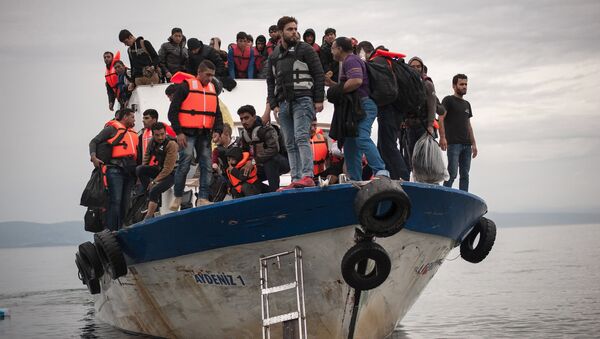MOSCOW (Sputnik) — Earlier on Friday, the European Union and Turkey agreed on an action plan that would provide Ankara with up to $3.4 billion in aid, ease EU visa restrictions for Turkish citizens and expedite accession to the bloc in exchange for cooperation on stemming the large-scale refugee influx to Europe.
According to the European Commission President Jean-Claude Juncker, the action plan is aimed at making sure that the refugees currently residing in Turkey stay put while ensuring that no refugees pass via Turkey, a major gateway for migrants wishing to reach the European Union, into the bloc.
"I believe that Turkey is making a mistake by concluding an agreement with the EU, which provides for retention of its maximum number of refugees on its territory in exchange for financial assistance to Europe," Didem Engin, a member of the Republican People's Party (CHP), said.
According to Engin, this step will have very serious social consequences. The politician said that the move was an attempt by the European Union to dissociate itself from the problems of refugees, putting the whole "social load" on the shoulders of Turkey.
According to Engin, it is "unacceptable" to trade the hosting of millions of refugees on Turkey's territory for easing EU visa restrictions for Turkish nationals traveling to the bloc.
Engin said that the CHP considers it wrong for Turkey’s government to make such important decisions, while parliamentary elections in the country are scheduled for November.
"The problem of the refugees cannot be solved by this kind of half-measures," Nazmi Gur, a member of the Peoples' Democratic Party (HDP), told Sputnik Turkey.
According to Gur, Turkey could have a significant effect on easing the refugee crisis if it changed its policy toward Syria, a country that has seen over 11 million of its citizens flee their homelands.
"To ensure Syria’s transition to democracy, Turkey must respect the will of the Syrian people and cease support of local radical groups," Gur said, adding that, "Turkey is using the refugees as a tool to obtain certain benefits and financial assistance from the European side. This is an unacceptable situation."
According to Gur, the strategy used by the bloc in negotiations with Turkey cannot solve the problem of refugees.
Ankara previously declared an open-door policy for refugees and has spent about $7.6 billion to date to host some 2.2 million Syrian refugees amid what has been called the largest migrant crisis since World War II.
Turkey has requested financial support, help in patrolling its borders, as well as a free movement deal with the bloc and expedited EU accession in exchange for strengthening its border control and cooperating more closely with Greece.

